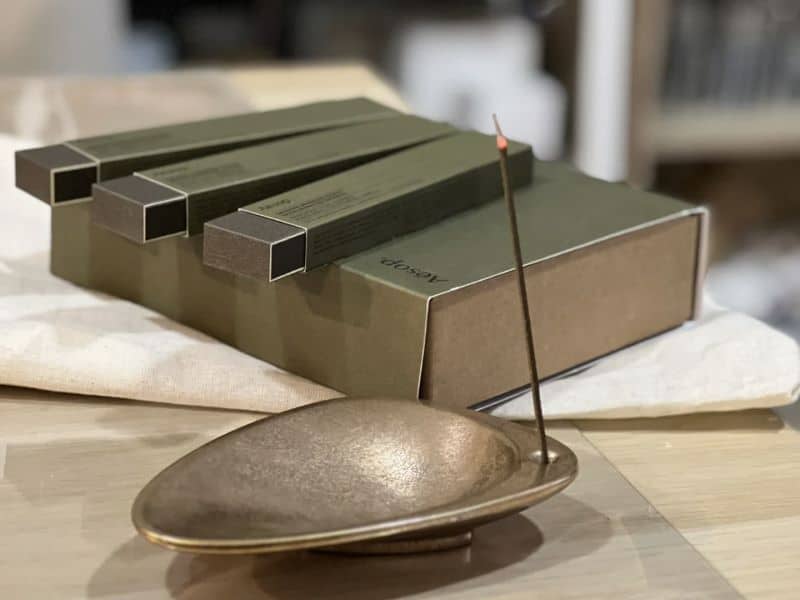For many people, burning incense is more than a trend to follow on Instagram. Burning incense is a great way to freshen up a room. It’s also a wonderful way to relax, but should pregnant women burn incense?
Incense can be bad for pregnancy under certain conditions. There are many factors involved, such as, how often you burn incense and the kind of incense that’s used. Burning incense further away from you or not at all might be the best option, in some cases.
Keep reading to learn how incense can potentially impact pregnant women and under what conditions burning incense might be okay.

Is Incense Harmful?
In most cases burning incense is a harmless activity. But without proper ventilation, incense can potentially worsen indoor air quality. As the incense burns, it can potentially release toxic carcinogenic chemicals, like:
- Benzene
- Carbon monoxide
- Formaldehyde
- Nitric oxide
- Polyaromatic hydrocarbons
- Sulfur dioxide
- Toluene
- Xylene
These chemicals are released in the form of tiny particles called particulate matter. Particulate matter (PM) is not as uncommon as suggested. The Environmental Protection Agency (EPA) describes PM as a mixture of solid particles and liquid droplets found in the air. Some PM, like that of incense smoke, is visible, but other forms of this matter can only be viewed under a microscope.
Inhaling particulate matter can lead to poor health conditions. You might experience eye, nose, or throat irritation. As finer particles move into your lungs and/or bloodstream, more serious conditions like heart or lung disease.
Those most vulnerable to illnesses connected to fine particulate matter are the elderly, babies, and children.
Exposure to PM occurs outdoors more than it does indoors because the source of PM is often construction projects, factory exhaust, vehicle engines, or forest fires.
You’ll notice that these sources are likely to produce huge clouds of smoke, dust, or soot. Natural incense doesn’t produce as much smoke. It’s possible that charcoal-based incense can pose more respiratory problems, like inflamed lungs, because its particulate matter is made up of larger molecules.
But even incense that’s dipped can generally be enjoyed in moderation so long as there is adequate air flow within the home.
Long-term use and excessive exposure to incense smoke has been linked to increased risk of respiratory tract cancer growth.
But there haven’t been any definitive connections between incense smoke and cancer.
Impact of Excessive Incense Smoke Exposure
Most of the research studies conducted on the detriment of burning incense is done in countries where incense is burned daily in temples.
You may have seen images or even experienced this practice. Billows of smoke fill the temple as hundreds of incense sticks burn simultaneously. Eye, nose, and throat irritation is common in these situations because smoke makes it difficult to see as you walk inside.
There’s so much smoke concentrated in one area that scientists have described the levels of chemicals from temple smoke to be higher than what you’d find released from vehicles at an intersection.
With that level of exposure to incense smoke, it’s understandable why individuals become ill. Burning a couple sticks of incense at home will not have the same impact on a person’s health.
If you have asthma or another preexisting medical condition that is agitated by smoke, and you want to burn incense, then you might consider burning natural, wood-based and non-dipped low smoke incense.
Is It Harmful to Burn Incense During Pregnancy?
Exposure to smoke in general can potentially impact a woman’s reproductive health. Common activities, like grilling, can post a respiratory challenge for a pregnant woman.
Smoke contains gases and chemicals, like polycyclic aromatic hydrocarbons that can harm a developing baby. These chemicals and gases can damage a developing baby’s nervous system. Prolonged exposure can lead to birth defects and even a miscarriage.
Although the Center for Disease Control (CDC) reports that exact levels necessary to cause these problems is unknown, it’s probable that you’d have to be engulfed in smoke in order for it to have a negative impact on you or your baby. There would need to be so much smoke that you lose consciousness.
In a more realistic example, if you work in an environment where you come in direct contact with smoke (as a firefighter, cook, toll booth operator, etc), then you’re more likely to inhale its harmful byproducts.
While it’s unlikely that incense could even produce enough smoke in your home to cause you or your baby harm, there are a few research studies worth mentioning.
Blood Pressure & Incense Burning
In a study published in Science of the Total Environment in 2017, researchers investigated whether a pregnant woman’s exposure to incense smoke at home might lead to high blood pressure levels. Thousands of Chinese women participated in this three year study.
Results indicated that women exposed to incense early on in their pregnancy did not have raised blood pressure levels.
Those who were exposed to incense smoke in their homes later in their pregnancy did experience higher blood pressure before giving birth. They were also found to be at higher risk for hypertensive disorders.
Birth Weight & Incense
A Taiwan birth study published in Environmental Health Perspectives in 2016 investigated correlations between infant health outcomes and exposure to incense smoke. More specifically, researchers measured birth weight and head circumference of over 15,000 babies.
Infant boys with prenatal incense smoke exposure were found to have a lower birth rate than boys who weren’t exposed to incense while in the womb. The same exposure didn’t have an effect on female infants. But both boys and girls had a smaller head circumference.
Although this study had a large sample size, results are specific to this region and would need to be tested in other countries. Additionally, this study didn’t measure the amount of incense these mothers were exposed to before giving birth.
Infant Motor Development & Incense
The same group of Taiwanese babies were part of a study that examined the motor development of infants exposed to prenatal incense smoke.
Babies between six and eighteen months old were assessed in their homes to determine whether they’d met their expected milestones.
There was an association between exposure to incense smoke in the home and meeting gross motor neurodevelopmental milestones.
Persistent exposure to incense smoke may have reduced their ability to roll over, hold up their head, begin walking, clap, and so forth.
Again, this was a very specific population, so the results aren’t generalizable. Also, there still isn’t any indication of the amount of incense smoke exposure.
Overall, it’s possible for incense smoke to harm an unborn child but it seems to be that exposure levels would need to be extremely high in order for this to happen.
Can You Burn Incense While Pregnant?
Burning limited amounts of incense while pregnant is unlikely to harm you or your baby.
When determining whether you should burn incense while pregnant, consider what kind of incense you burn, how often, and in what setting.
Only Burn Natural Incense
You’ll be able to recognize natural incense because the ingredients are usually printed on the outer package. Brands like Nippon Kodo, Shoyeido, and Baieido are excellent choices, and they offer low smoke incense as well.
Natural incense doesn’t have any additives, and they aren’t made with charcoal, so they’re less harmful for you and your baby.
Limited Frequency
You may not want to keep incense burning all day when you’re pregnant, but this is something that you can discuss with your doctor.
Based on the limited research studies that do exist, it seems that limited exposure to the incense smoke is best.
Consider Proximity
But how close you are to the incense smoke also matters. You should never burn incense and then leave the room, but you can place it as far away from you as possible. In this way, you aren’t directly inhaling the smoke.
Proper Circulation
Another factor is air quality. You never want to burn incense in an enclosed space without some sort of ventilation. Whether you open a window or door, or choose a different method, air needs to circulate.
TIP: Burn natural incense on the opposite side of the room in a space with adequate ventilation, and you and your baby will likely be okay.
Final Thoughts
There’s no definitive way to know whether or not incense is bad for pregnancy. If you are having a high-risk pregnancy, then it’s best to consult with your obstetrician before deciding whether or not to burn incense.
Excessive exposure to incense smoke – meaning burning tens or hundreds of sticks at a time in a confined space for the full nine months – might harm your baby. Otherwise, limiting your use, burning it at a distance, and sticking to natural incense, are reasonable options to consider.
This post does not provide medical advice. Since there are many different reasons for burning incense, some involving religious practice or cultural traditions, always consult with your physician if you have concerns.
